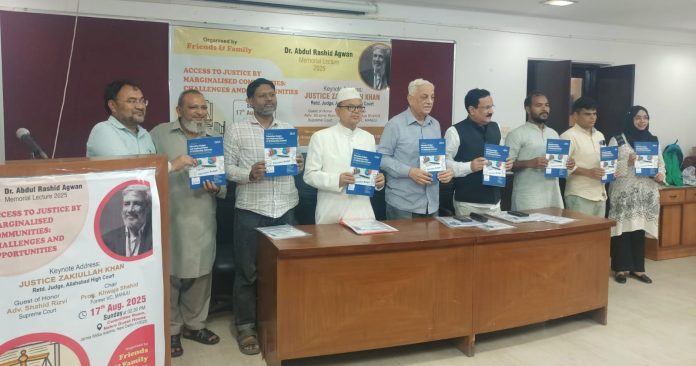– Mohd.Naushad Khan
New Delhi: The Dr. A.R. Agwan Memorial Lecture turned into a reality check on Delhi’s education spending and justice for marginalized groups. Jurists and educationists presented a fact sheet and gave strong addresses on systemic failures.
A report titled “Education Budget and Implementation of Scholarship Schemes: An Analysis of Delhi Government” was released by Prof. Asheref Iliyan, Dr. Manzoor Ali, Dr. Khalid Khan, and Kazi Nazrul Islam of the Institute of Policy Studies and Advocacy. It revealed that Delhi’s education expenditure is stuck at 1.3–1.4% of GSDP. Funds under Samagra Shiksha and the Right to Education (RTE) remain poorly utilized.
For SCs, OBCs, and minorities, centrally sponsored scholarships face weak execution. Restrictive norms and lengthy processes leave thousands excluded. Welfare budget for SC/ST/OBC groups has fallen from 0.69% in 2019–20 to 0.27% in 2024–25. Even these reduced funds remain underused, showing a lack of priority for weaker sections.
Minority schemes such as tuition fee reimbursement and financial aid also suffer from hurdles, poor outreach, and low entitlements. The report called for higher public investment, simpler documentation, higher income criteria, financial aid of at least ₹5,000 yearly, and strong awareness campaigns.
Justice Zakiullah Khan, retired judge of Allahabad High Court, delivered the memorial lecture. He condemned discrimination and violence against minorities. He cited episodes where Muslims were singled out in communal clashes. He highlighted the plight of students and scholars jailed after the Delhi riots.
He said Muslims have progressed in civil services, medicine, and global leadership. Yet, political leadership remains silent on their issues. He reminded that “education is the most powerful tool for upliftment.” Without it, marginalized groups will stay vulnerable.
Senior Advocate Shahid Rizvi spoke on “Access to Justice.” He said justice must come not only from the Constitution but also from moral values. Quoting Qur’an (Surah Nisa 4:135), displayed at Harvard Law School, he stressed impartiality even against one’s kin or self. He argued that centuries of oppression require a justice system sensitive to Dalits, Muslims, and other marginalized communities.
Prof. Khwaja Shahid, President of the All India Educational Movement, presided over the programme. He remembered Dr. Agwan as a scholar and activist. A fellowship in Agwan’s name was launched. Advocate Humaira and Aafreen were chosen to research access to justice for marginalized groups. Their findings will be presented at the next memorial lecture.
Prof. Shahid asked whether law produces reform or if reform must come before law. He noted that laws like the Domestic Violence Act or Child Marriage Act cannot succeed without democratic change. “The law and constitution are works in progress,” he said. Justice matters only when women, children, Dalits, Adivasis, and the poor feel they truly receive it.
The report and lectures gave one clear message. Without strong investment in education and a justice system based on equity, India’s promise of equality will stay unfulfilled.
The programme was organised by family and friends of Dr. Agwan in his memory.




